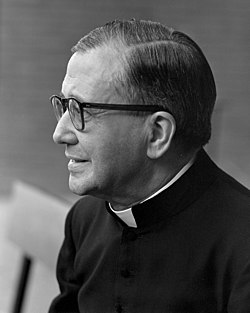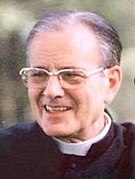This article has multiple issues. Please help improve it or discuss these issues on the talk page . (Learn how and when to remove these messages)
|
This list of Opus Dei saints and beatified people includes not only saints of the Catholic Church and those officially beatified by the Church (beati), but also those considered venerabili, servants of God or candidates for sainthood, who are faithful of the Prelature of Opus Dei. [1]
Contents
In the year 1928, Fr. Josemaría Escrivá, a diocesan priest in Zaragoza, Spain, received the inspiration of establishing Opus Dei (English: Work of God), a way by which Catholics might learn to sanctify themselves in and through their secular work. [2] After its foundation, numerous people from different walks of ordinary life and nationalities became members. The institution later received pontifical approval from Pope Pius XII. It has become one of the largest existing Catholic organization for lay faithful in the Catholic Church, existing in 90 countries. [3] Opus Dei is formally known as the Prelature of the Holy Cross and Opus Dei.
Since its establishment, numerous faithful have earned a reputation for holiness and eventually canonized or beatified. The first to reach the glories of the altar was Escrivá, who was canonized in 2002 by Pope John Paul II. He was followed by his successor, Bishop Alvaro del Portillo, who was beatified in 2014. In 2019, Guadalupe Ortiz de Landázuri Fernández de Heredia, [4] was beatified, the first lay faithful of Opus Dei to be given such an honor.
- Josemaría Escrivá
- Archbp. Óscar Romero
- Bp. Álvaro del Portillo
- Guadalupe Ortiz de Landazuri
- Montse Grases
- Toni Zweifel
- Fr. Joseph Muzquiz
- Dr. Ernesto Cofiño
- Tomas and Paquita Alvira
- Bp. Adolfo Rodríguez Vidal
- Dora del Hoyo











